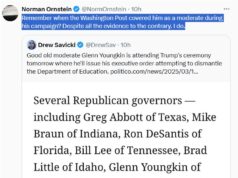
1. Koppel refers to “a long-gone era of television journalism, when the networks considered the collection and dissemination of substantive and unbiased news to be a public trust.” I’m not sure that era really existed, although I fondly remember tuning in to watch Walter Cronkite and thinking, “if Walter Cronkite say it, it must be true.” Now, that might have been incredibly naive of me at 10 years old or whatever, but – to paraphrase Cronkite – “that’s the way it was” back then for most people; we trusted Cronkite and the other major news network anchors to provide us with factual, relatively unbiased news from around the world.
Today, that time seems like an eternity ago, in a galaxy far far away. On the other hand, this is the same country where wildly biased, sensationalistic and irresponsible newspapers (aka, “Yellow Journalism”) helped foment the Spanish-American War. This is also the same country where we’ve always had newspapers that were overtly partisan, biased, pro-Lincoln, pro-secession, McCarthyist, etc. In other words, today’s situation in some ways is nothing new – “plus ca change, plus c’est la meme chose?” And, in a way, what’s wrong with that, as long as the news outlets – or blogs, or specific “news” personalities – don’t try to hide their biases and pretend to be “objective.” Here at Blue Virginia, for instance, we make no pretense to being “objective,” although we always do try to be accurate and factual. But, just as Too Conservative (note the honest name?) and other blogs in the “rightosphere” are clearly biased in the rightward direction, progressive blogs are biased in the leftward direction. So what, as long as they make that clear, under the operating theory that full disclosure acts as the best sunlight?
2. Which brings me to something I find far more insidious — the news media pretending to operate under a purely factual “objective” model, but failing miserably in almost every way at doing so. For starters, being “objective” does NOT – repeat NOT – mean that there are two equivalent “sides” to an “argument.” For instance, on global warming, “objective” journalism does NOT mean giving equal time – or, frankly, ANY time! – to climate deniers like Myron Ebell, bought and paid for by the fossil fuel industries. That would be like giving equal time to the Flat Earth Society or to people who deny evolution, when the science is 100% clear that the earth is round (well, spherical) and that evolution is a robust scientific theory that has been proven over and over and over and…
2a. Then, we’ve got this bizarre hybrid of news that claims to be objective, but then exhibits wild biases in a large number of ways. First, the news it decides to cover, leaning heavily towards “controversy,” “if it bleeds it leads,” “sexy,” “two sides,” “the horse race,” “infotainment,” blah blah blah. What’s striking is to read an intelligent magazine, like The Economist, or watch an intelligent TV news show (mostly an oxymoron) like the NewsHour, then compare it to the brain-dead drivel that you’ll find on ABC, CBS, NBC, let alone the cable networks.
2b. As if that’s not bad enough, there’s also all the news that is not covered. Watch the BBC one night, it’s startling to see all the things that are not considered “news” by U.S. “news” organizations but are considered “news” by the BBC. In part, that’s a result of massive cutbacks to foreign bureaus, in part by the imperative to make money, in part by supply and demand, and I’m sure a lot of other factors. The question is, what’s the chicken and what’s the egg here? Is the media “giving the people what they want,” or is it actively contributing to “dumbing down” the public it claims to serve?
2c. Then, there’s the dearth of full disclosure by the media of its profit-motivated bias, which is pretty much all pervasive. For instance, the Kaplan Washington Post company makes most of its revenue via the for-profit “education” industry, not through its news division. That’s just one example of a pervasive phenonemon, which is that the “news” media is part of large corporations – General Electric (NBC), The Walt Disney Corporation (ABC), National Amusements and Viacom (CBS), Rupert Murdoch’s News Corporation (Fox), etc. They also sell advertising to stay in business. In short, they are heavily beholden to, if not completely controlled by, these corporations. In the past, that may have been the case as well, but as Ted Koppel points out, “it never occurred to the network brass that news programming could be profitable” (until “60 Minutes” came along in 1968). Koppel continues:
The transition of news from a public service to a profitable commodity is irreversible. Legions of new media present a vista of unrelenting competition. Advertisers crave young viewers, and these young viewers are deemed to be uninterested in hard news, especially hard news from abroad. This is felicitous, since covering overseas news is very expensive. On the other hand, the appetite for strongly held, if unsubstantiated, opinion is demonstrably high. And such talk, as they say, is cheap.
Agreed, talk is cheap, and highly profitable as well. In contrast, sending out correspondents to dig for facts and maintaining bureaus all over the world is expensive, and despite our crying need for this type of coverage, apparently people prefer their nightly dose of infotainment, blather, and demagoguery.
3. But, you say, what about the rise of the internet, where every citizen can be a journalist and news reporting/analysis is “democratized?” I’d argue that this could be a positive development in theory, but I’m not so sure about that in practice. In fact, the quip that “Democracy is the worst system every invented, except for all the other ones,” springs to mind here. The problem is, as in most everything, 99% of what you read online – and view on the TV, etc. – is crap (poorly written, poorly researched, sloppy, not fact-checked, false, you name it). Sure, there’s superb writing, reporting, and analysis taking place online, but you’ve got to wade through a sea of sludge to find it. And who’s got the time or energy for that?
Another shortcoming of the internet – and really of the entire news media these days – is accountability, when you can be anonymous/pseudonymous online, when the “barriers to entry” are extremely low, when ultimately nobody holds anybody – the Andrew Breitbarts of the world, not to mention the Glenn Becks and Rush Limbaughs – accountable for their outright lies, wildly irresponsible behavior, demagoguery, racism, anti-Semitism, demonization, etc. Why are these people still employed? Why would networks continue to hire the likes of Erick Erickson? It boggles the mind.
To conclude this long, rambling semi-rant, here are a couple of comments from the Washington Post website (where, I’d point out, anyone can leave a comment, no matter how outrageous, bizarre, false, etc. – another sign of the decline of “news”?) that I agree with strongly.
*”The freedom of the press which is so highly touted as America’s strength has turned into the freedom to tell outrageous lies and falsehoods to an unsuspecting and duped population that then act on those falsehoods.”
*”With the advent of the internet and 24/7 broadcasting, there is a lot of time that has to be filled with content. Most of that content is garbage.”
*”…O’Reilly, Hannity, Olbermann, Maddow, Matthews et al are NOT news programs. They are opinion programs.”
What do you think?



 Sign up for the Blue Virginia weekly newsletter
Sign up for the Blue Virginia weekly newsletter








